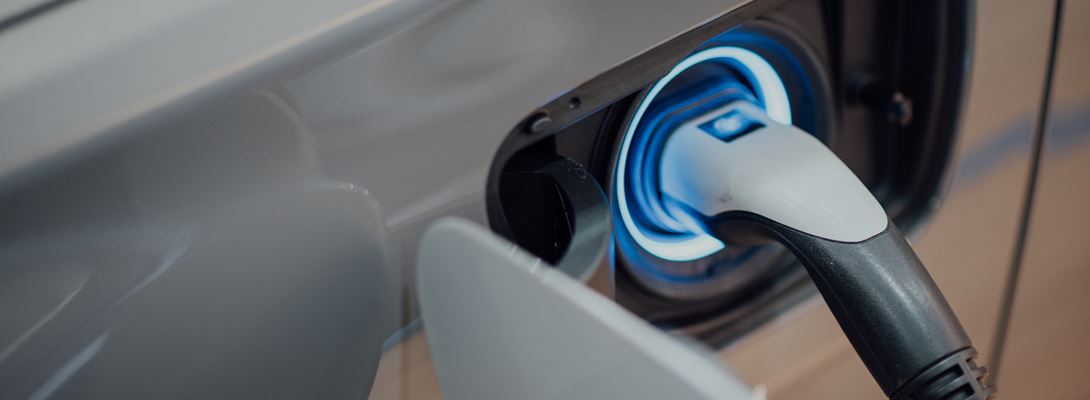When customers charge their vehicles during off-peak electricity periods (such as 8pm-6am), our experience has shown it costs around 90% less to 're-fuel' compared to a petrol or diesel vehicle.
In Guernsey, it will cost the average driver approximately £0.02 per mile.
What is the best way to charge an electric vehicle?
If you can see yourself driving electric and would like to future-proof your home, an electric charging point is an excellent investment.
These compact mini-charging points can fully charge a vehicle in as little as 3-hours. They work with all makes of electric vehicles and are simple to use.
It is much quicker and safer than charging from a 13-amp plug, which could take several hours or an entire night to charge.
Depending on the vehicle model, it is possible to charge your electric vehicle from a normal mains supply. Many manufacturers do provide a charging lead which can be plugged into a 13 Amp socket. However, a home charging point is recommended as the car will charge much quicker, more safely, and also avoids cable trailing outside your home.
In Guernsey, there are various public car charging points including designated charge points in the car parks at North Beach, Salarie Corner, and the Odeon.
This video briefly demonstrates how the public charging points work and this helpful Q&A guide will answer some of your questions.
Are electric vehicles actually cleaner than petrol or diesel cars?
Greenhouse gas (GHG) emissions from transport account for 15% of the total UK GHG according to the Office for National Statistics.
It's important to consider environmental impact on a product's lifecycle - from exploration, to manufacture, to final use.
Electric vehicles produce far less pollution on their lifecycle basis. During production, EVs may produce more CO² compared to a diesel car but are far more efficient in operation. This means the carbon output is eventually negated during the vehicles lifetime.
And there are schemes which recycle and reuse electric vehicle batteries.
For example, Guernsey Electricity supply the Powervault 3eco battery storage system, which can be installed in a garage and store solar energy or off-peak electricity. These smart battery systems use recycled, second-life batteries from electric vehicles and come with a 3-year warranty.
The electricity mix in Guernsey is made up of imported renewable energy, locally-generated solar power, and generation at the Vale power station. This mix produces significantly less carbon than fossil-fuels based on a vehicle's lifecycle.
That means each EV you see is making a significant contribution to a healthier environment as that driver no longer emits chemicals and pollution with each journey.
Over 90% of our electricity comes from renewable sources in France, such as hydro, wind and solar power. On-island solar power also contributes to the electricity grid on a community scale, from sites such as Guernsey Electricity, Guernsey Post, and the Waste Transfer Station.
By the mid-2020s, we plan to be 100% renewable. This significantly decreases the carbon footprint of each electric vehicle driven and the volume of pollution in the air we breathe.
Can the grid cope with electric vehicles if they all charge at once?
Put simply, no. However nor could it cope if everyone switched on the kettle at exactly the same time. And our roads couldn't cope if everyone left their home and drove into town at exactly the same time.
The infrastructure and networks are designed to accommodate peaks in demand, which takes into account that people use electricity at different times.
In Guernsey, the average driver will only drive around 20 miles per day. This means their car only needs to be charged about once every 4 or 5 days, perhaps plugged into the power grid for around 5% of the time. If electric vehicles are charged during late evenings and overnight when demand on the power grid is lower, there will be plenty of capacity in the system to charge electric vehicles.
Charging EVs during ‘off-peak’ Economy 12 times will mean customers can charge their batteries and run their cars for as little as 2 pence per mile. Many EV models have built in charging timers meaning you can plug your car in when you get home but still make the most of your off-peak tariff, whilst helping us manage the demand on the grid.
Is Guernsey’s network ready for an electric future?
Guernsey Electricity continually reinvest in the power network infrastructure in anticipation of a fully electric future as part of the global journey to decarbonisation.
Long term this will mean all homes and businesses can charge electric vehicles, however it will take time for the network to gradually be replaced and upgraded. The continued progress of energy technology means better control of the electricity grid in terms of energy supply, demand and storage. This will help ensure the energy transition can be managed effectively over the coming decades.
- The benefits of electric vehicles in a snapshot
- An electric car will cost you less to operate than an average petrol or diesel-fuelled vehicle
- Considerably lower carbon footprint
- Reduction in local air pollution
- Less maintenance thanks to fewer moving parts, including no spark plugs or fuel filters
- No need for oil changes










